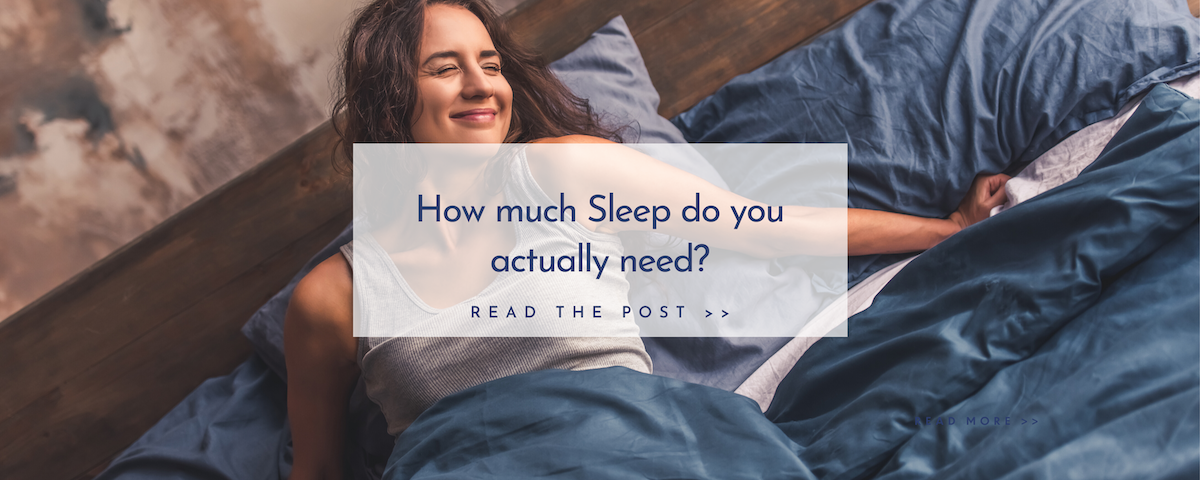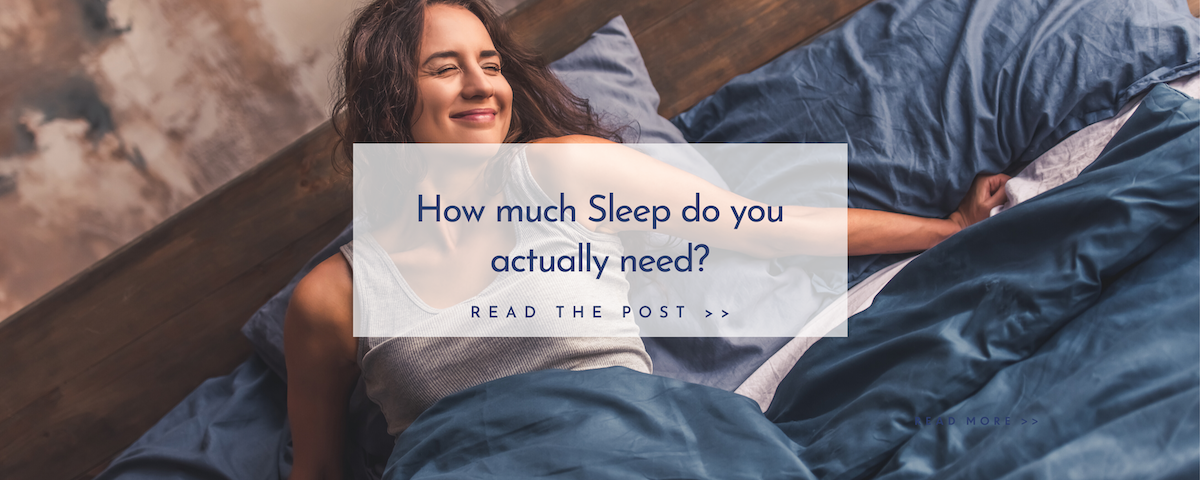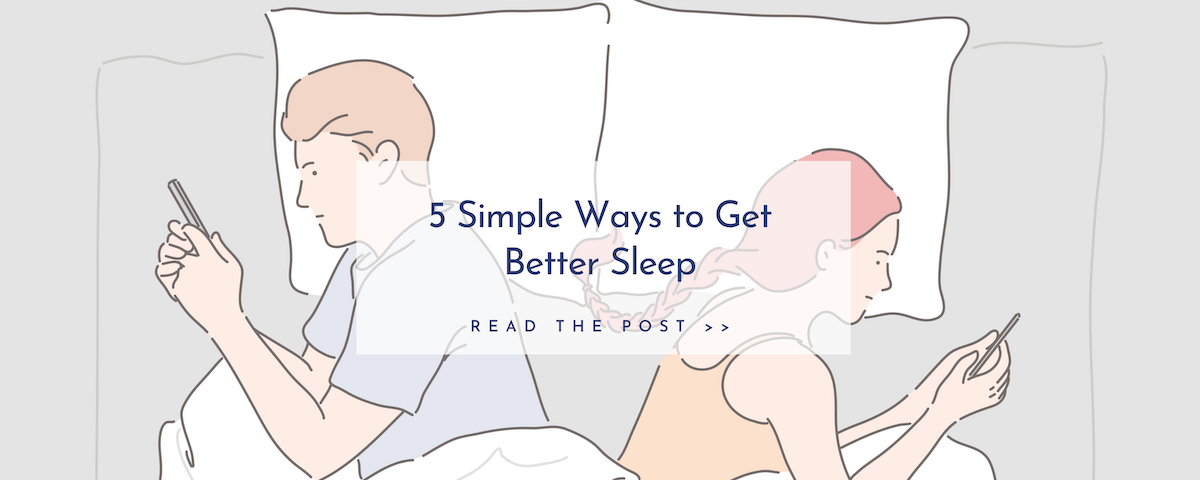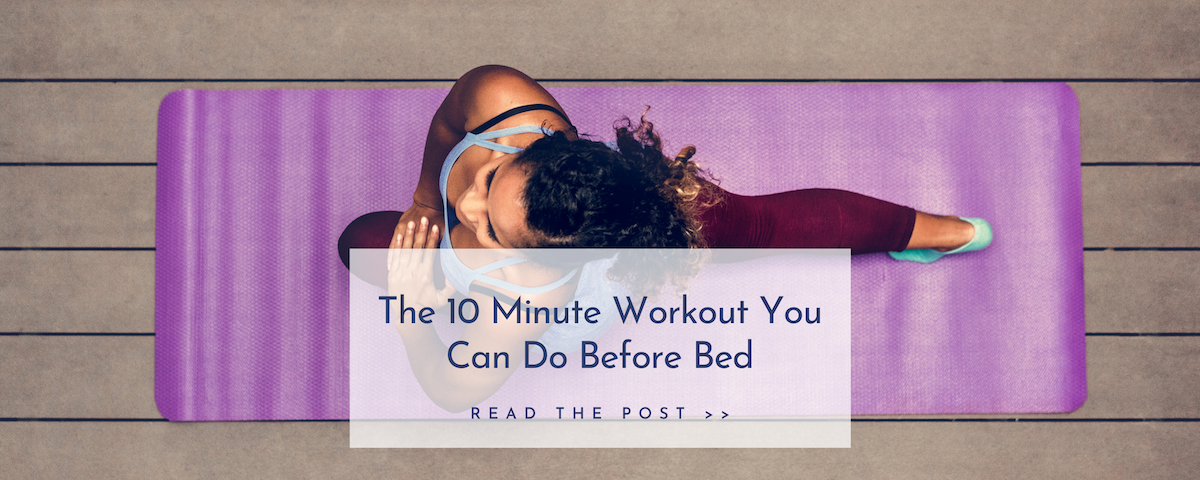How Much Sleep do You Actually Need?
Sleep is absolutely essential for good health
We spend up to a third of our lives sleeping, but when life gets busy, it’s often the first thing we sacrifice, putting our physical and mental health at risk. Whether it’s stress, diet, lifestyle or illness, there are many things that can affect the length and quality of sleep. Getting the balance just right takes a little knowledge and planning.
Why it’s important?
Good sleep is just as important for maintaining our overall health, as a balanced diet or regular physical exercise. The quality and length, will affect your energy, emotions, brain and heart performance and general productivity. In fact, while you snooze, your body is hard at work.
Your brain works to prepare itself for the day ahead by carrying out ‘biological maintenance’ that keeps your whole body in good working order. Just like when you service your car – it changes the oil, re-calibrates the brakes, checks the tyres and tunes the engine! In the brain, experiences, emotions and information from the day are processed and committed to memory. Your body also rebuilds the muscles that have been working all day and removes any harmful toxins in the body.
Heard of a ‘body clock’? While you’re sleeping, the body regulates the circadian rhythm, also known as your internal clock. This clock runs on a 24-hour schedule and can affect your metabolism, immune function and inflammation too.
Sounds like a lot, right? While there’s no clear definition for good quality sleep, it’s usually determined by how long it takes you to fall asleep, how often you wake up and how rested you feel when you wake up the next day.
What happens when it’s neglected?
The Australian Sleep Association reports that at least one-third of the adult population regularly suffers from significant sleep problems. Furthermore, thirty-five per cent don’t feel refreshed when they wake in the morning. Unfortunately, lack of sleep can lead to more problems than just feeling tired. You can struggle to concentrate, memory functions slow down and your mood is affected. The brain takes longer to process information and you’re less capable of making clear decisions due a reduction in normal cognitive function. Creativity can also be hampered. A study found that getting only five hours sleep per night can decrease mental and physical performance as much as having a blood alcohol level of 0.06.
How much sleep do you actually need?
This depends on a number of factors, meaning every individual has a unique need and preference. The National Sleep Foundation breaks their sleep recommendations down by age group;
- 0-3 Months – 14-17 hours
- 4-11 Months – 12-15 hours
- 1-2 Years – 11-14 hours
- 3-5 Years – 10-13 hours
- 6-13 Years – 9-11 hours
- 14-17 Years – 8-10 hours
- 18-64 Years – 7-9 hours
- 65+ – 7-8 hours
However, there are a number of additional factors that may increase or decrease your needs:
Genetics – Certain illnesses or genetic variations, like Autism Spectrum Disorder can influence your sleep requirements. Additionally, common disorders such as sleep apnoea or insomnia affect its quality. If you think a disorder is impacting your sleep, you should seek professional advice from your doctor.
Injuries – According to Safe Work Australia, work related injuries and illnesses between 2008 – 2009 were estimated to be worth $60.6 billion. Back, wrist and shoulder pain are the most common ailments reported by workers and can lead to disturbed sleep or insomnia if not treated properly. If you’re suffering from back pain, we think we’ve found a solution.
Bed and Mattress Quality – It’s important to get a good night’s sleep in a bed that is both comfortable and supportive. An ergonomic mattress is tailored to your individual size and shape.

Tips for a better sleep
Good quality sleep is vital to good health, so it’s important to get the recommended amount per night. Here are some more tips to help you sleep well:
- Get into a routine – Going to bed at the same time each night will help regulate and fine-tune your body clock – yes, even on weekends!
- Stay off electronics – Your devices and TV emit light which can suppress melatonin (the hormone that controls your sleep cycle and circadian rhythm), and keeps your brain awake for longer.
- Reduce caffeine, alcohol and tobacco consumption – Caffeine, smoking and drinking alcohol can lead to poor quality sleep by affecting your body clock. A study even found that consuming caffeine 6 hours before bedtime can reduce sleep by up to one hour!
- Be active – Regular physical activity can help you sleep better and feel more energised for the day ahead – try out these yoga poses which will work your body and mind and assist with sleep.
- Invest in an ergonomic mattress – An ergonomic mattress that’s tailored just for you can increase your quality of sleep by providing personalised comfort and support. An ergonomic bed provides near-perfect support for your body and can be adjusted to suit the changing lifestyle and needs of you and your partner.
It’s important to listen to you body. Pay attention to how you’re feeing at night, when you wake up in the morning and throughout the day. Determine if you feel that you’re getting enough sleep and if you feel tired and sluggish during the day, you may need to make some changes. Make the most of your sleep – create good habits, schedule your sleep, balance your diet and choose a good bed and mattress to create the best possible sleeping environment.
At Beds for Backs, we are so obsessed with your sleep that we have designed a one-of-a-kind, world exclusive, ergonomic bed that ensures you get the best support and rest. View our range and visit your nearest store to find the best bed for your needs and lifestyle.



